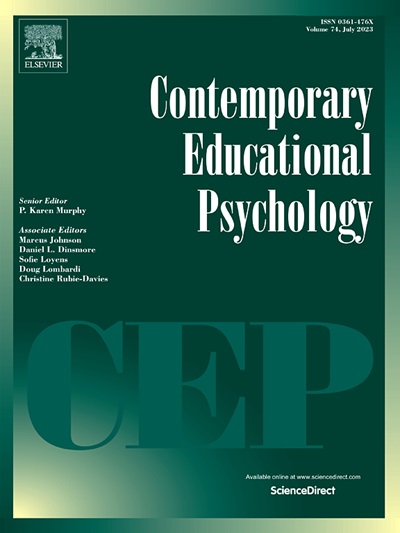A growth-theory-of-interest intervention helps align science students with a new multidisciplinary curriculum
IF 3.8
1区 心理学
Q1 PSYCHOLOGY, EDUCATIONAL
引用次数: 0
Abstract
What happens when well-intentioned changes to curricula clash with students’ pre-existing academic identity? In the present study, students entered a two-year pre-university school strongly identified with science but not arts—an identity that did not fit with their school’s new multidisciplinary curriculum that mandated engagement with both academic areas. We investigated the efficacy of a growth-theory-of-interest intervention (O’Keefe et al., 2023)—which promoted the view that academic interests are developed rather than inherent and fixed—in helping students reap the benefits of the new curriculum. We conducted a randomized controlled field experiment with incoming students who overwhelmingly identified as interested in science but not arts (N = 151). Before matriculating, students were randomly assigned to complete the growth-theory-of-interest intervention or active-control materials. Approximately 7 months later, students in the intervention condition reported a stronger arts identity (without diminishing their science identity), and stronger fit and belonging in school, relative to the active control condition. Moreover, whereas developing a stronger arts identity was associated with lower belonging in the control condition, this drop was eliminated in the intervention condition. Finally, by improving students’ school belonging, the intervention indirectly predicted higher year-end GPAs. The results underscore the intervention’s efficacy in promoting a mindset conducive to multidisciplinary learning and facilitating students’ fit and belonging within a curriculum intended to enrich their educational experiences and future career prospects.
兴趣成长理论干预有助于理科生适应新的多学科课程
当善意的课程改革与学生原有的学术身份发生冲突时,会发生什么?在目前的研究中,学生们进入了一所为期两年的大学预科学校,这所学校强烈认同科学而不是艺术,这与他们学校要求参与两个学术领域的新多学科课程不相符。我们调查了兴趣增长理论干预(O’keefe et al., 2023)在帮助学生从新课程中获益方面的有效性。该干预促进了学术兴趣是发展而非固有和固定的观点。我们对绝大多数对科学感兴趣但对艺术不感兴趣的新生进行了随机对照实地实验(N = 151)。在入学前,学生被随机分配完成成长兴趣理论干预或主动控制材料。大约7个月后,与主动控制组相比,干预组的学生报告了更强的艺术认同(没有削弱他们的科学认同),更强的契合度和对学校的归属感。此外,在控制条件下,发展更强的艺术身份与较低的归属感相关,而在干预条件下,这种下降被消除了。最后,通过提高学生的学校归属感,干预间接预测了更高的年终gpa。结果强调了干预在促进有利于多学科学习的心态和促进学生适应和归属于旨在丰富他们的教育经历和未来职业前景的课程方面的有效性。
本文章由计算机程序翻译,如有差异,请以英文原文为准。
求助全文
约1分钟内获得全文
求助全文
来源期刊

Contemporary Educational Psychology
PSYCHOLOGY, EDUCATIONAL-
CiteScore
16.50
自引率
3.90%
发文量
74
期刊介绍:
Contemporary Educational Psychology is a scholarly journal that publishes empirical research from various parts of the world. The research aims to substantially advance, extend, or re-envision the ongoing discourse in educational psychology research and practice. To be considered for publication, manuscripts must be well-grounded in a comprehensive theoretical and empirical framework. This framework should raise critical and timely questions that educational psychology currently faces. Additionally, the questions asked should be closely related to the chosen methodological approach, and the authors should provide actionable implications for education research and practice. The journal seeks to publish manuscripts that offer cutting-edge theoretical and methodological perspectives on critical and timely education questions.
The journal is abstracted and indexed in various databases, including Contents Pages in Education, Australian Educational Index, Current Contents, EBSCOhost, Education Index, ERA, PsycINFO, Sociology of Education Abstracts, PubMed/Medline, BIOSIS Previews, and others.
 求助内容:
求助内容: 应助结果提醒方式:
应助结果提醒方式:


